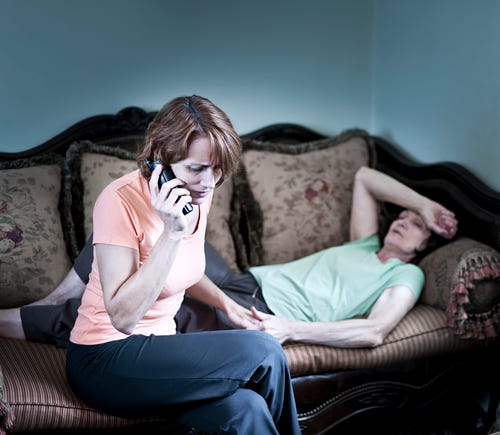
Hippocrates would be turning over in his grave. A man who admonished caregivers to do no harm, and to use food as our medicine as well to exercise regularly, has to be rather displeased with modern medicine.
A doctor, by definition, listens, and attends to a patient’s symptoms. In the past, and I’m old enough to recall this rather vividly, that same doctor would poke, prod, ask excellent questions, and then listen carefully before pronouncing what they thought a patient might have. That doctor was also interested in the environment in which a patient existed, recognizing that many illnesses spring from stress, abuse and violence. Understanding that larger universe is key to putting symptoms in context, and getting to the core of a problem.
Treat the source, not the symptoms, in other words.
My, how far we’ve fallen indeed.
In a society that has traditionally tested men, not women, to find out how illnesses develop and are treated, and most especially white men, is it any surprise that medicine tends to validate men’s claims of pain or problems? https://www.sfgate.com/health/article/Medical-research-has-focused-on-males-4330773.php. Even when studying diseases that happen far more to women, such as Alzheimer’s, researchers prefer to study men or in the lab, male mice. To say the least, this has left the field both woefully under-informed and grotesquely unprepared, but it has also left both researchers and doctors with the distinct impression that the only symptoms that are valid are those that are shared by men. After all, women present more complex research issues, like pregnancy and menstrual cycles. That makes studying men vastly simpler. Men don’t suffer the emotional swings that monthly cycles bring on. They don’t go through the change of life in the same way. They’re a whole lot less messy.

Put vastly more succinctly, researchers are lazy. Because menopause and pregnancy and monthly cycles “get in the way,” they are viewed as something to be avoided. That kind of institutionalized prejudice informs not only research but the doctors who rely on that research. So when a woman presents symptoms that don’t track (please read: don’t look like what men experience) then the knee -jerk response is that “it’s in her head,” or “she’s hysterical.” The word hysterical comes from the Latin for “of the womb,” so it’s a uniqely gender-based slam that the medical community wields broadly to explain what they can’t or are not willing to validate as real symptoms.
The symptoms can’t possibly be valid because the research doesn’t show it. Well of course. The research didn’t study women. And even when it does include women it doesn’t work hard enough to separate out those unique responses which would give critical clues to what doctors are seeing. Our bodies and brains and hormones are different, which presents more complex test results. That’s hard work. Clearly the research community has decided that hard work isn’t worth it. At least yet. In 1993 the National Institute for Health required women to be included in studies, which is a start. Yet the medical community still lacks clear instruction and guidance to interpret those symptoms and experiences unique to women. How indeed are we supposed to trust people who are both prejudiced and often clueless when it comes to women’s bodies, brains, symptoms and particular needs?
What an easy way to sweep a woman’s unique and perfectly legitimate bodily experiences under the rug as messy and inconvenient and ultimately, not valid. In other words, the very fundamental processes that allow these researchers to exist in the first place are “inconvenient.”

While some of this is slowly changing, as we begin to see that diseases like Alzheimer’s hit women far more than men, this dismissive attitude towards women’s symptoms remains terrifyingly widespread. As a disabled vet who utilizes the VA system for much of my healthcare, this is exacerbated by the simple fact that vastly more men than women use the services. Doctors far more accustomed to working with men are neither equipped nor are they particularly adept at handling symptoms that are uniquely female. My personal experience is that they don’t hear the symptoms in the first place if they don’t fit what they’re accustomed to hearing. Second, they tend to leap to swift early conclusions and provide prescriptions and procedures that often have nothing to do with what might be really wrong.
This is just one reasons that doctors in American make something like twelve million misdiagnoses each year https://www.cbsnews.com/news/12-million-americans-misdiagnosed-each-year-study-says/.
This happened when a team of VA urologists insisted that I had an overactive bladder, which I knew I didn’t. They pushed me very, very hard to have Botox injected into my urethra. As it turned out I had kidney stones. Such misdiagnoses are rife among doctors who are as lazy as the researchers, and who simply don’t care enough to do the sleuth work to find out what’s really wrong. This kind of doctoring takes time and a thoughtful, unprejudiced ear.
Add to this the pressure from insurance companies to spend less and less time with the patient, and rewarding prescriptions and procedures over wellness strategies.
I was reminded of this kind of medical prejudice recently when the surgeon who did my rotator cuff back in late May pooh-poohed my report of a very serious concussion the day after surgery, along with three very bad falls right on top of the surgical site as “hysterical.” He later told me a story- just to make a point- that a male patient of his had fallen down the stairs. Now THAT, he said, was a real accident.
Of course it was. It happened to a man.
We women used to question the veracity of our observations about symptoms when a doctor tossed them aside or pronounced them as “strictly mental.” We still do. In some ways it’s still the Dark Ages.
This is how we die.
In an NPR interview, author Maya Dusenbery (Doing Harm) describes how women will enlist the help of a male to validate their symptoms. http://www.wbur.org/npr/597159133/how-bad-medicine-dismisses-and-misdiagnoses-womens-symptoms. This is precisely what I had to do. Until I had a six foot, 205-pound bodybuilder in my surgeon’s face, my complaints about falls weren’t valid.
To be fair, the BF himself runs into this kind of arrogance, when he faces off with a doctor and challenges their assumptions. He reported that one doctor got in his face and asked “Who do you think you are to question ME?” Well, the BF has studied kinestheisology, nutrition, and knows one whole hell of a lot about his body for one thing, and for another, he has excellent instincts. We all have every single right to challenge our doctors. When they respond like this it’s time to dump them. They’re dangerous.
Not only does having to bring the BF piss me off royally, especially as an athlete who really knows her body, but it’s supremely insulting to have to bring a man into the room to prove that what I say is real. This isn’t Saudi Arabia. This is America. Yet we are so far behind the times that it’s appalling. It also annoys the holy bejesus out of my boyfriend, who was around during the worst of it. In fact just yesterday that same BF had to get into my surgeon’s face by phone to get them to move swiftly on a test because my shoulder is in agony. My complaints weren’t being taken seriously. Now they are. It’s exhausting to be shoved aside until you bring in the big guns.
The Heart Attack Issue, Among Others
Dusenbery says that one study showed that women under 55 were seven times more likely to be sent home from the ER while right in the middle of a heart attack. I’ve had one. It was misdiagnosed. “Oh, you’re just tired. Get some rest.” Women’s heart attack symptoms are fundamentally different from men’s. But doctors know what to look for in men. The problem is that many female doctors and nurses are just as complicit in this ignorance, and just as likely to demean or dismiss symptoms because they’re women’s. That’s because it’s how the industry at large sees women, and completely ignores or makes light of real pain, real symptoms. Or, they have an ingrained prejudice based on age and gender, which is another whole ball game.
I had this experience when I went to the VA’s emergency room a few years ago for a travel-related intestinal complaint. A female doctor looked at my age (64 at the time) and then my numbers. My oxygenation- the amount of oxygen in my blood- was high, at 100%. Without asking me a single question she marched into the exam room and ordered me to “increase your meds, you’re over-oxygenated.” Here’s the problem with that. First, by the time I showed up I’d already done 60 laps at the pool and run some 2400 steps. As an athlete, I am regularly oxygenated because I push myself very hard. I gave this female dunce job a withering look and told her that at 17,500 feet en route to the summit of Kilimanjaro my oxygenation was at nearly 93% and my pulse was in the low sixties. She told me that I was panting too hard because I was anxious. I was so damned mad.
We have a system that does not teach doctors to doctor- but to leap to false assumptions based on numbers that don’t necessarily track with what they think they’re supposed to be seeing. While that’s a good reason to think one thing, a good doctor will verify by asking lifestyle questions. As in, what did you do this morning (that might have led to your oxygenation level)? How about two and a half solid hours of aerobic exercise, doctor? What the hell did YOU do this morning? Increasing certain meds for certain people can be disastrous. In fact for me, they were, which is why I dumped all my meds almost a year ago, with few exceptions, and feel vastly better as a result. More meds? Right. Not for my tiny body weight at 120 pounds.
This is how we die.
Symptoms can also easily be caused by medicines tested on men, calibrated to men’s body weight, and then given to women as a one-size-fits-all. When women present with a whole different set of reactions and problems to over-medication because of this issue, we are also ignored and pooh-poohed as though it’s our fault the medicine doesn’t work.
This is how we die.
While women are hardly alone in their experiences of thoughtless, uncaring medical workers- that twelve million number includes plenty of men- it continues to trouble me that the attitude towards women patients is that we simply cannot possibly know our own bodies as well as a doctor does. When I was a young lieutenant in the Army, I saw a doctor for a female problem. When I told him I’d found what felt like a suspicious lump inside my vagina, he responded with real horror,
“What the hell are you doing feeling around in there?”
He outranked me, so I couldn’t respond how I felt. Which was, edited for mass consumption,
WHO THE HELL ARE YOU TO QUESTION MY RIGHT TO KNOW MY OWN BODY? WHO THE HOLY HELL ARE YOU TO IMPLY THAT I HAVE NO RIGHT TO TOUCH, EXPLORE AND UNDERSTAND THE BODY I INHABIT? WHO THE HOLY HELL DO YOU THINK YOU ARE, GOD?????
Indeed, he did think he was God. And that’s the sickness that continues to inhabit a great many male doctors, who treat female patients with, at best, dismissal, disregard and disrespect. That we have no right to touch ourselves- that’s for a man to do: at his leisure, at his pleasure and with or without our permission.
When I was in Egypt on adventure travel several years ago I got a very bad case of food poisoning. I was delivered to a hospital of sorts, where I sat with a male doctor. I was describing my symptoms, and the headaches I had, by telling him that they were emanating from the sub-occipital area. He stared at me in shock, that I would know such a term. This doesn’t surprise me from an Egyptian doctor. Not at all. But when I get the same response from an American male doctor, it does. Patients today have vastly more knowledge, and younger women athletes in particular know their bodies well because they have to.

First world medicine is only as good as its practitioners. While research is helpful to a point, it’s only useful if it gives medical practitioners valuable insight into both sexes. And beyond that, it’s the doctor’s job to do the genuine detective work by setting aside their own prejudices and judgments, which is damned hard for anyone, but even more so for those suffering a god complex. Increasingly, doctors are just plain wrong. In a hurry to shove you out the door to get to the next (wallet), you get misdiagnosed, given a script intended for someone twice your body weight, and made to feel wrong for challenging said doctor for not hearing everything you had to say…which by the way might have fundamentally changed their notion of what’s ailing you.
My best doctoring experience came recently while in Indonesia. I was struck down by severe intestinal cramps. The doctor was on call, and he spent two full hours going over me with a fine-toothed comb, poking, prodding, asking important and thoughtful questions. He sat next to my bed and studied research on his phone, referenced his materials, and gave me meds based on my answers and his very thorough investigation. Then he came back the next day to spend another two hours, demanding that the hotel restaurant make me some rice and fruit, waiting until I had eaten, and until I got up and walked around in such a way that he was fully satisfied I was feeling more chipper. For all this, including the scripts, I handed over $250, and was delighted to do so.
That’s doctoring. Informed by genuine concern, patience, an inquisitive mind and a commitment to get to the source, this doctor got me well in no time flat.
Comments powered by Talkyard.